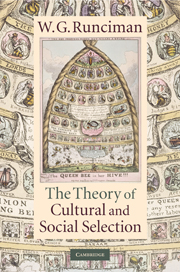Book contents
- Frontmatter
- Contents
- Preface
- Prologue: The Darwinian legacy
- 1 The neo-Darwinian paradigm
- 2 Natural selection and evoked behaviour
- 3 Cultural selection and acquired behaviour
- 4 Social selection and imposed behaviour
- 5 Selectionist theory as narrative history
- Epilogue: Sociology in a post-Darwinian world
- References
- Index
Prologue: The Darwinian legacy
Published online by Cambridge University Press: 05 June 2012
- Frontmatter
- Contents
- Preface
- Prologue: The Darwinian legacy
- 1 The neo-Darwinian paradigm
- 2 Natural selection and evoked behaviour
- 3 Cultural selection and acquired behaviour
- 4 Social selection and imposed behaviour
- 5 Selectionist theory as narrative history
- Epilogue: Sociology in a post-Darwinian world
- References
- Index
Summary
‘THE SINGLE BEST IDEA …’
When Karl Marx wrote to Ferdinand Lassalle in January 1861 that On the Origin of Species had furnished him with a natural-scientific grounding for the class struggle in history, he could hardly have guessed the extent to which, by the end of the following century, Darwin's theory of natural selection would have been triumphantly vindicated but his own theory of class struggle falsified by subsequent events. It was not as if Darwin succeeded in his lifetime in meeting the objections to the theory of natural selection which his critics levelled against it. Nor could he, since he had no possible way of knowing how biological inheritance actually works. The irony on which many of his biographers and commentators have remarked is that he could have read Mendel's subsequently world-famous paper about cross-pollinated garden peas. But, even if he had, it would not have given him all the answers he needed. Decades later, self-styled Mendelians could still be anti-Darwinians. It was only when the ‘new synthesis’, as it came to be called, brought together evolutionary theory and population genetics that it became possible to resolve the seeming conundrum that if biological inheritance was blended selection couldn't operate at all (which in fact it can), while if it was particulate it couldn't operate in the way that Darwin supposed (which in fact it does).
- Type
- Chapter
- Information
- The Theory of Cultural and Social Selection , pp. 1 - 26Publisher: Cambridge University PressPrint publication year: 2009



